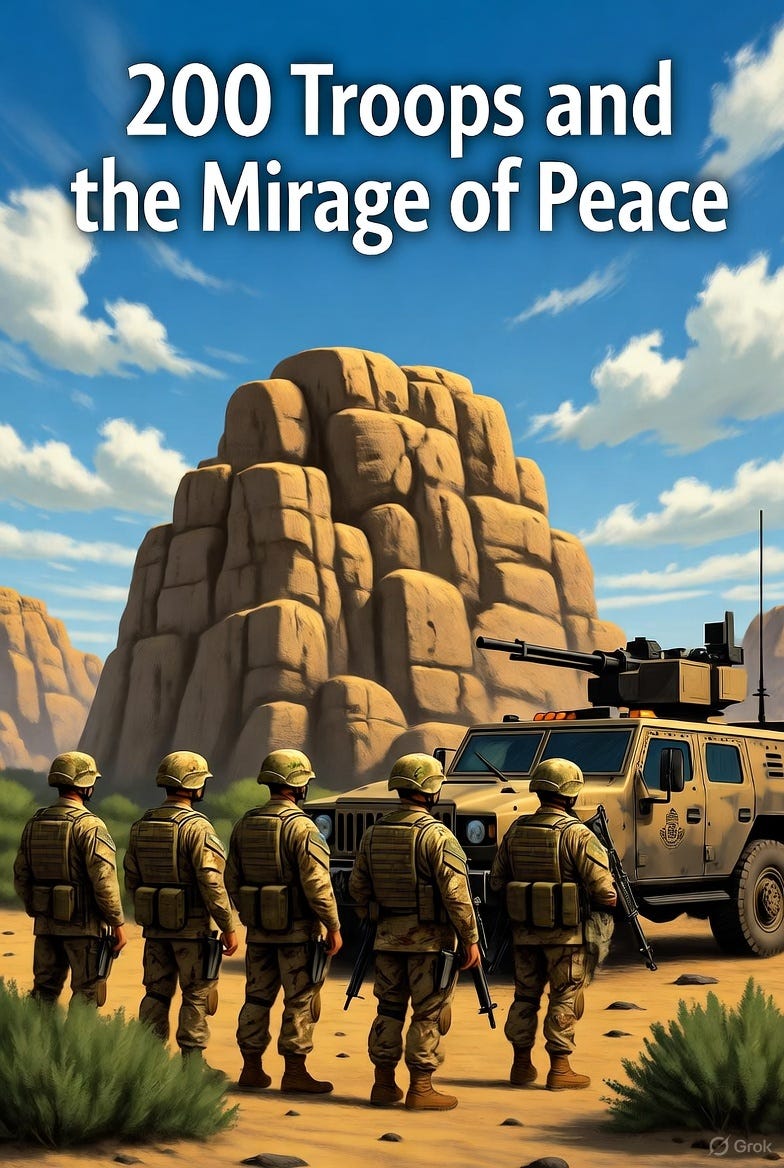200 Troops and the Mirage of Peace
There’s something rotten in the Holy Land again—there always is—and this time it reeks of stale politics, photo-op diplomacy, and that strange American addiction to “peace through deployment"
There’s something rotten in the Holy Land again — there always is — and this time it reeks of stale politics, photo-op diplomacy, and that strange American addiction to “peace through deployment.”
Two hundred troops. That’s the magic number. A nice round figure, just enough to look serious in the headlines and not enough to bother the Pentagon bean counters. “Monitoring the ceasefire,” they say. Christ — that’s like sending a lifeguard to monitor a shark tank.
This isn’t about peace. It never is. It’s about optics — a flickering mirage projected from Washington’s war room, where “peacekeeping” means “keeping the cameras rolling until the next election cycle.” The machinery of empire runs on oil, fear, and the illusion of control — and nothing sells control like a few clean-shaven Americans standing in the desert, squinting nobly into the sunlight.
Trump, ever the showman, has pulled another card from his deck of chaos — a “brokered peace deal” that sounds suspiciously like a rerun of every broken promise since The Green Line. A ceasefire in Gaza, a handshake for the cameras, a tweet declaring victory. Then the guns fall silent — briefly — before the real violence resumes, buried under rubble, bureaucracy, and press releases.
And so, America sends its “peacekeepers” — a token force dressed in desert camo and moral ambiguity — to stand between two sides who’ve seen a century of betrayal. They’ll monitor the ceasefire, yes, but from what vantage point? A bunker? A drone feed? A sanitized brief written by some junior analyst who’s never smelled cordite or blood?
Meanwhile, the Brits — ever cautious, ever calculating — step aside. No troops, no entanglement. Perhaps they’ve learned their lesson from Basra and Helmand?
They call it a truce. I call it intermission. The curtain’s down, the actors are changing costumes, and somewhere offstage, the next act is already being scripted.
Don’t be fooled — this is not the dawn of peace. It’s the old play in a new costume, and the director hasn’t changed. The Pentagon loves a proxy, the State Department loves a press conference, and America — that wild, restless beast — still believes it can buy redemption one deployment at a time.
Two hundred troops.
Two hundred witnesses to history’s longest hangover.
And when it’s all over — when the ceasefire cracks, the headlines fade, and the body count climbs again — those same soldiers will return home, medals polished, mission “completed,” while Gaza remains what it has always been: a scar that the world pretends not to see.


